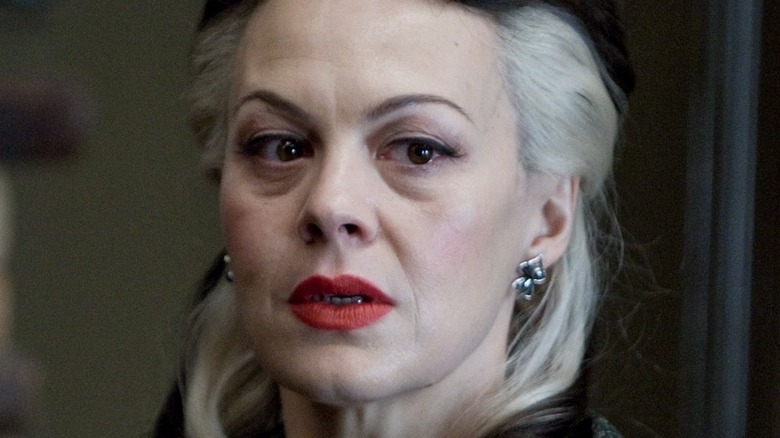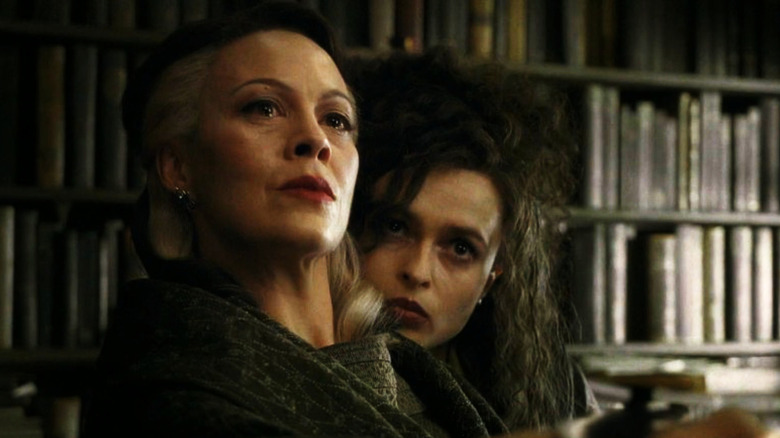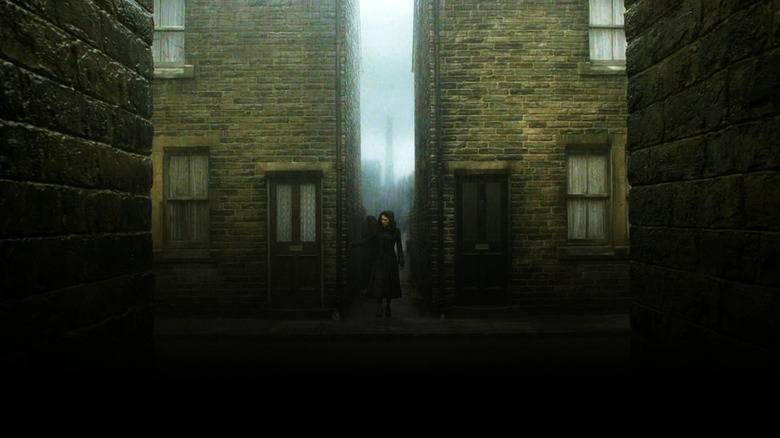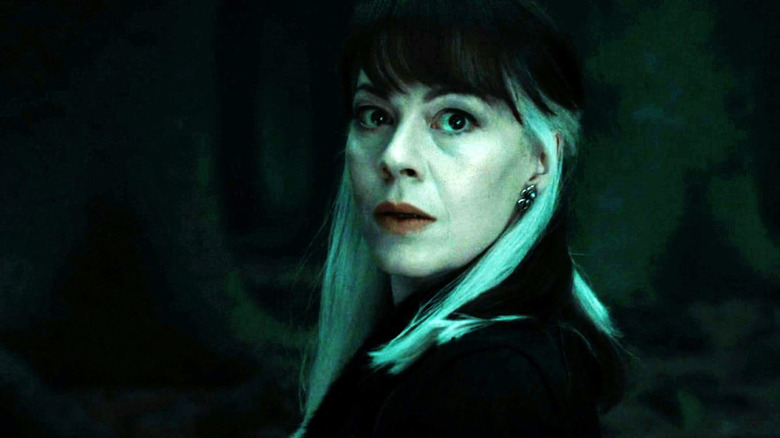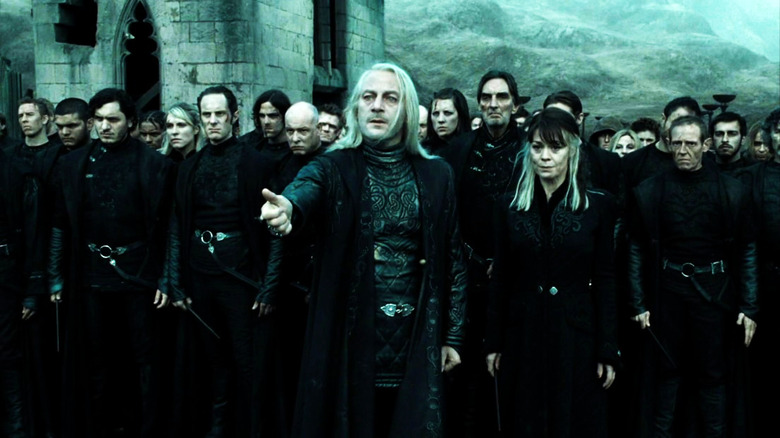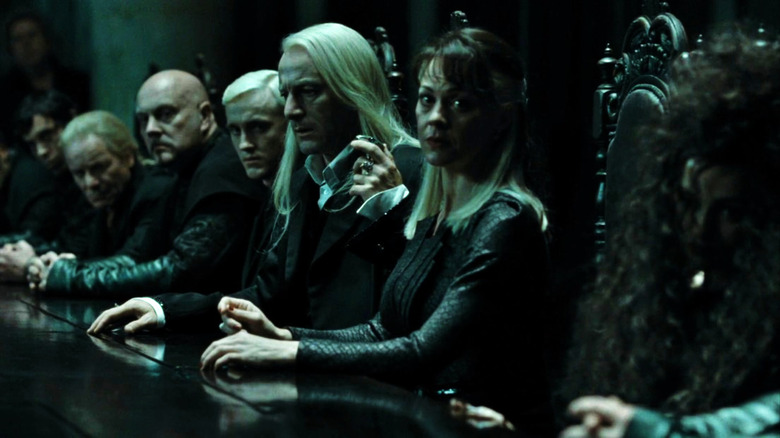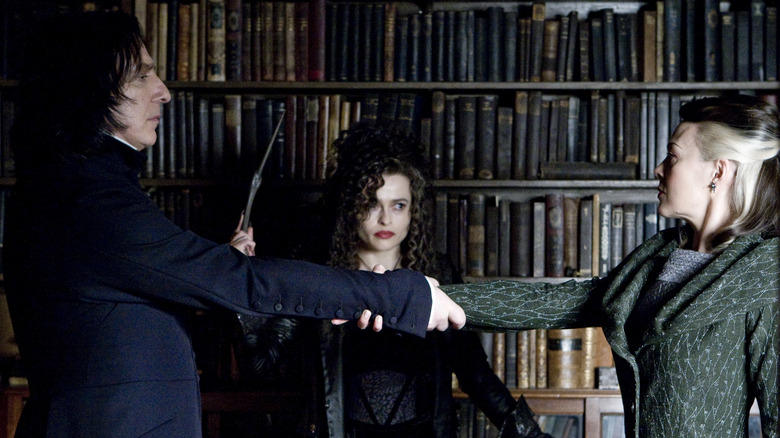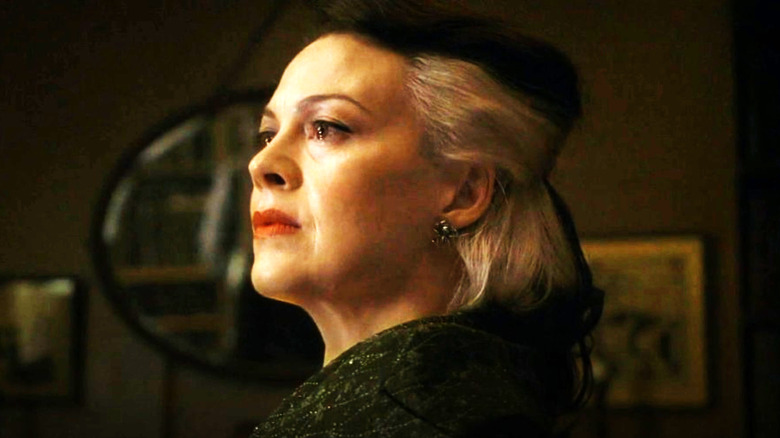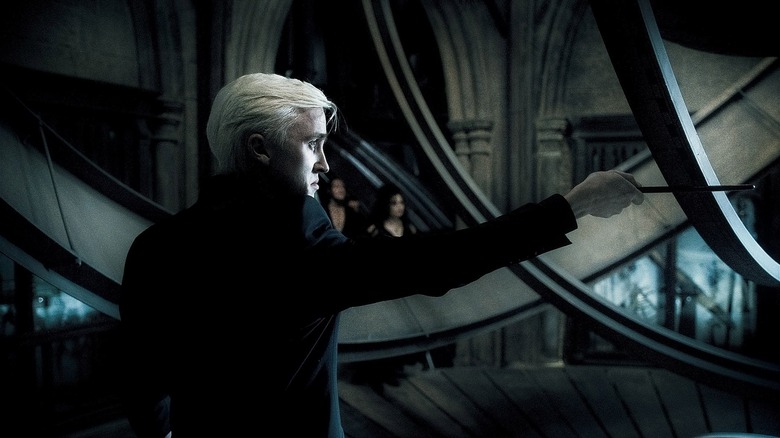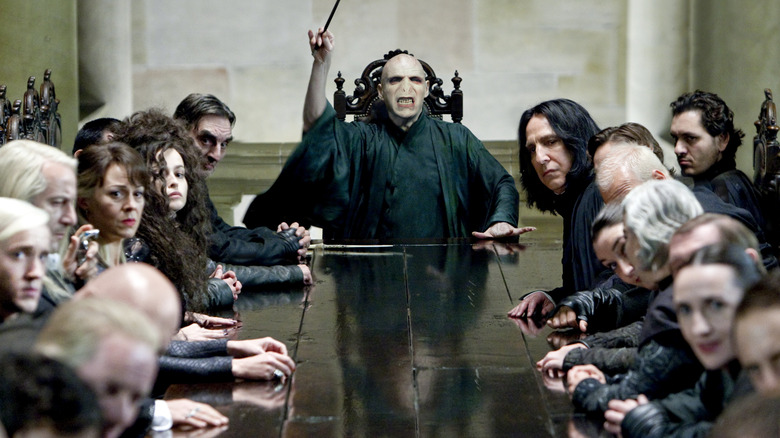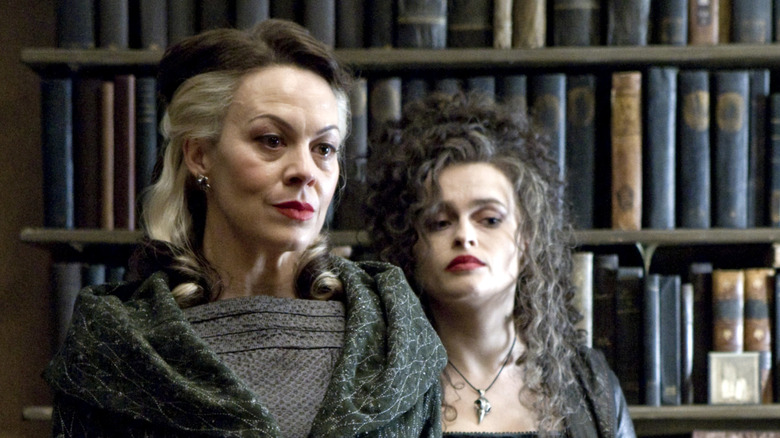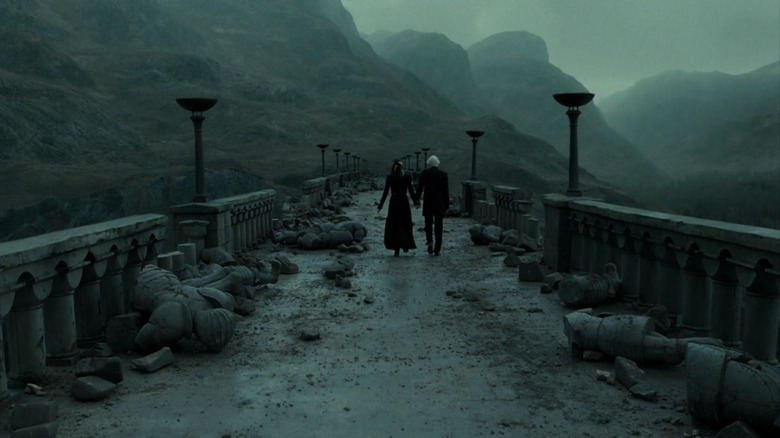The Untold Truth Of Narcissa Malfoy From Harry Potter
Among the ensemble of wizards featured in "Harry Potter," there are many unsung heroes — and just as many unsung villains. While Narcissa Malfoy might not qualify as an all-out villain, her nuanced character adds dimension to the ongoing war between good and evil. Though she fights on the side of Voldemort, her allegiance is grayer than simply choosing one team or the other. Narcissa is an example of someone who fights more for the sake of herself and her family — especially her son, Draco — and if the means to that end happens to be a path of darkness, so be it.
In the limited pages the reader has with her in the books, and her even more limited screen time in the films, we see a character determined to chart her own destiny in spite of her past, her extended family, and ongoing current events. Though she tends to stay in the background, Narcissa is hardly unimportant. In fact, her decisions set into motion events that, on multiple occasions, change everything for the wizarding world, whether the other characters realize the first domino fell with her or not. This is the untold truth of Narcissa Malfoy from the "Harry Potter" series.
Narcissa's family tree
Narcissa Malfoy is intricately connected with many prominent "Harry Potter" characters. For starters, Draco Malfoy is her son and Lucius Malfoy is her husband. Living with Harry Potter's school rival and one of Voldemort's most well-known Death Eaters invites unending conflict into Narcissa's personal life, as she constantly seeks to protect her son and vouch for her husband.
Even before she married Lucius, though, Narcissa's family tree was steeped in the lore of Great Britain's wizarding world. As detailed on Pottermore, Narcissa is the third and youngest daughter of Cygnus and Druella Black, and she has very different relationships with her two sisters. Bellatrix becomes a Death Eater later in life and often works with Narcissa's husband, while Andromeda is cast out of the family after marrying the Muggleborn Ted Tonks. With Andromeda giving birth to Nymphadora Tonks, this makes Narcissa Tonks' aunt, a fascinating connection that never really comes to the surface in the series. Through her parents, Narcissa is also the cousin of Sirius Black, Harry Potter's godfather. Author J.K. Rowling pointed out in a 2004 web chat that Narcissa is the only person within the Black family tree to not be named after a constellation.
Narcissa comes to the forefront later in the series
We meet Draco and Lucius long before Narcissa enters the story. Draco is a prominent adversary to Harry from their very first day at Hogwarts in "Harry Potter and the Sorcerer's Stone." Lucius, meanwhile, is introduced in the second volume, "Harry Potter and the Chamber of Secrets," as a secondary antagonist and owner of Dobby the house-elf.
Therefore, by the time Narcissa is introduced, her reputation precedes her. Given the intensely menacing personalities of her son and husband, the audience might make some initial assumptions about how Narcissa fits into the established mold of the Malfoy family. Discussing her role in the series becomes a study of how she conforms to these expectations while simultaneously defying them, expanding the audience's preconceptions of what it means to be a Malfoy and how Narcissa asserts herself as an individual.
In the books, Narcissa first appears in "Harry Potter and the Goblet of Fire" as a spectator with her family at the Quidditch World Cup. In the movies, she doesn't appear until the sixth film, "Harry Potter and the Half-Blood Prince," as Draco's storyline of being tasked to kill Dumbledore takes center stage.
Helen McCrory almost played a different character
The late Helen McCrory played Narcissa Malfoy on film in the last three "Harry Potter" movies. McCrory's extensive career included credits on screen, including her memorable role of Polly in the television series "Peaky Blinders," and on stage, playing the role of Lady Macbeth in a 1995 production of the Scottish play on the West End. BBC reported that McRory passed away from cancer in 2021.
Entertainment Weekly notes McCrory was initially cast as Bellatrix Lestrange, Narcissa's sister and a much more eccentric character than the reserved Mrs. Malfoy. McCrory's pregnancy led to her giving up the role, which ultimately went to Helena Bonham Carter.
McCrory enjoyed being part of the "Harry Potter" legacy. "I had no idea what an enormous phenomenon it was until I joined it," she said during the press tour for 2010's "Harry Potter and the Deathly Hallows – Part 1." She soon realized how big the franchise was amongst fans and casual audiences alike. "The first time you go to the premiere and you hear the screams as Dan Radcliffe arrives in the car, it is like seeing the Beatles or something for the first time."
Slytherin? Yes. Death Eater? No.
Like all the Malfoys, Narcissa was a Slytherin during her time at Hogwarts. Slytherin House is known for its students being ambitious and cunning, producing more dark wizards than any other house.
While Narcissa is no doubt villainous, she doesn't go quite as far to the dark side as her husband. Lucius pledges allegiance to Voldemort by becoming a Death Eater, but Narcissa never does. She is loyal to her husband and, by association, is often entangled in the exploits of Death Eaters across the decades, but she never officially joins their brethren.
This distinction says a lot about her character. For one, she doesn't go with the flow just because others around her are doing so — even if they're the people she's closest to. Narcissa's husband, sister, and eventually her son all join the ranks of the Death Eaters. They're arguably the three most important people in her life, and yet she is still reluctant to make a formal commitment to Voldemort. This shines as an example of Narcissa's individuality on principle and also speaks volumes about how she might really feel about the war at large. If it weren't for her family, she might not even be involved, but because they are, she'll be with them to the end — but on her own terms.
Narcissa narrowly avoided a very different life
Following the infamous night when Voldemort tried to kill baby Harry, many Death Eaters were captured and taken to Azkaban. According to "Harry Potter and the Goblet of Fire," among those who almost got sentenced to a lifetime in the wizarding jail was Lucius Malfoy. He avoided punishment by claiming his evil actions were done while under the Imperius Curse, meaning that he was being controlled by someone else. Instead of jail time, Lucius retained his job at the Ministry of Magic and his status as a high-brow, upper-class wizard.
At the time of Lucius' close call, he and Narcissa were already married, and Draco was an infant. Had Lucius been taken to Azkaban, the remainder of Narcissa's life and the entirety of Draco's would have been completely different, especially after Voldemort rose to power again.
To play devil's advocate, though, the course of events might have ended up with more or less the same final results regardless. Lucius is sent to Azkaban anyway following the events of "Harry Potter and the Order of the Phoenix," and soon escapes, implying he may have been able to do the same thing if imprisoned earlier.
Narcissa's actions lead Snape to do the unthinkable
Arguably the action with the most ripples of consequences in the "Harry Potter" series is Snape killing Dumbledore. The death occurs during the climax of "Harry Potter and the Half-Blood Prince." While Narcissa Malfoy isn't even present during the sequence, it is she who sets the plot point into motion.
At the beginning of Draco's sixth year at Hogwarts, studies are the last thing on his mind. In addition to officially becoming a Death Eater, Draco has orders from Lord Voldemort to kill Albus Dumbledore. Anxious for her son's safety and worried about what Voldemort might do if Draco doesn't succeed, Narcissa asks Severus Snape to keep a watchful eye on Draco. The professor does her one better — he agrees to the Unbreakable Vow, a pact that magically binds Snape to his word. Snape will protect Draco at all costs, and if Draco is unable to kill Dumbledore, Snape is obligated to kill Dumbledore himself.
What Snape knows and everyone else doesn't is that Dumbledore is already dying. In his hunt for Horcruxes, Dumbledore is hit with a curse, one that initially renders one of his hands unusable but will quickly spread to his entire body. With Dumbledore's death inevitable, Snape's promise is actually convenient, but, of course, costs him everything in terms of his reputation. And it's all thanks to Narcissa.
She's not afraid of Harry
For brevity's sake, the "Harry Potter" movies often have to omit scenes as they adapt the story for the screen. While Narcissa Malfoy's character isn't cut too dramatically in the transition, the books still place her in a role of greater prominence than the movies do. In particular, "Harry Potter and the Half-Blood Prince" contains a pretty hefty scene for Narcissa that's absent from the film.
As Harry, Ron, and Hermione shop for clothes and books for the forthcoming school year in Diagon Alley, they run into Draco and Narcissa inside Madam Malkin's Robes For All Occasions. Draco immediately calls Hermione a Mudblood, a derogatory term for a Muggle-born wizard, to which Harry and Ron raise their wands toward him before Narcissa swiftly threatens them.
"Put those away," she tells the boys. "If you attack my son again, I shall ensure that it is the last thing you ever do." She continues, "I see that being Dumbledore's favorite has given you a false sense of security, Harry Potter. But Dumbledore won't always be around to protect you." It's perhaps the most threatening dialogue she has in the entire series.
Narcissa could have switched allegiances
As Draco threatens to kill Dumbledore toward the end of "Harry Potter and the Half-Blood Prince," the headmaster offers him the chance to put his past behind him and change for the better. Despite everything Draco has done, Dumbledore still valiantly chooses to see the good he can be.
"Come over to the right side, Draco, and we can hide you more completely than you can possibly imagine," Dumbledore promises him. "What is more, I can send members of the Order to your mother tonight to hide her likewise. Your father is safe at the moment in Azkaban. When the time comes, we can protect him too. Come over to the right side, Draco. You are not a killer."
Draco denies the help, but it's fascinating to imagine the remainder of the series — and the alternate trajectory of the Malfoys' lives — if he had taken it. Without the obligation of Lucius, would Narcissa freely fight on the side of the Order of the Phoenix? Would she gladly take Dumbledore's protection, or would she be just as hesitant as her son? Where would Voldemort set up headquarters for the Death Eaters, since Malfoy Manor would be out of the question? We may never know the answer to these questions, but it's fun to speculate nonetheless.
Her home becomes Voldemort's headquarters
In "Harry Potter and the Deathly Hallows – Part 1," Voldemort and his Death Eaters are out in the open and spreading their reign of terror across the wizarding world. They hope to achieve complete domination of wizardkind and beyond, and they'll soon do so if the Order of the Phoenix is out of their way. As they grow in their ranks and make plans for their dominion, the Death Eaters need a home base. Lucius obliges, hosting them at his home, Malfoy Manor.
While Lucius and Narcissa's feelings toward this decision are only ever communicated in the nuances of the performances by Jason Isaacs and Helen McCrory, they each see the situation quite differently. Lucius is honored, if only because of his desperation to gain Voldemort's approval after denying his involvement as a Death Eater all those years ago. Since Voldemort's return, Lucius has become a weak shell of his once haughty stature and will do anything to please Voldemort if it means earning his favor. Narcissa, though, is less than thrilled. At this point in the story, it could be argued that they both care more about their family's survival than Lucius' allegiance to Voldemort, but seemingly have no other choice than to save face and keep marching on.
Narcissa's wand gets involved in a web of confusion
One of the famed Deathly Hallows is the Elder Wand, which grants its owner invincibility in combat, and the search for it drives the final entries in the series. Unbeknownst to most characters, Dumbledore is in possession of the Elder Wand in the last moments of his life during "Harry Potter and the Half-Blood Prince."
Snape may have killed Dumbledore, but just prior to that, Draco Malfoy disarmed Dumbledore with the "Expelliarmus" spell. This means that from this moment forward, the Elder Wand belongs to Draco, even if Draco never physically has it in his possession. At the climax of "Harry Potter and the Deathly Hallows – Part 1," Harry disarms Draco in Malfoy Manor. For most of the remainder of the series, Harry has Draco's wand, and this action subsequently means the Elder Wand answers to Harry when he eventually obtains it.
To compensate for his lack of a wand, Draco starts using Narcissa's. It's never explained whose wand Narcissa uses in its stead, if she does at all, but it can perhaps be assumed that she's willing to go wandless, even in the face of war, if it means Draco is safe.
Mom first, Villain second
When forced to choose between glory for the Death Eaters and the protection of her son, Narcissa's decision is easy. She cares for Draco more than anything, and in attempting to keep him safe, she achieves the impressive feat of deceiving Voldemort.
Toward the end of "Harry Potter and the Deathly Hallows – Part 2," Voldemort tries to kill Harry in the Forbidden Forest, surrounded by Death Eaters and Narcissa. After knocking Harry over, Voldemort demands that Narcissa check to see if Harry is dead or alive. Stepping forward and leaning over Harry, she asks him in a hushed whisper if Draco is still alive. Harry ever so slightly nods his head, not noticeable to anyone beyond Narcissa's close proximity. Narcissa then stands up and tells Voldemort that Harry is dead.
In the book, author J.K. Rowling explains the incident differently. As Narcissa approaches Harry, she feels his heartbeat. She knows he's alive. Describing Harry's train of thought, Rowling writes, "Narcissa knew that the only way she would be permitted to enter Hogwarts, and find her son, was as part of the conquering army. She no longer cared whether Voldemort won." In an interview with Hypable, Rowling noted that Narcissa's actions at this moment mirror that of Lily Potter's at the very beginning of the series. Both women stood up in the face of Voldemort to protect their sons.
Helen McCrory filmed alternate endings for Narcissa's final appearance
In adapting any book for the big screen, there are often discrepancies, some made out of necessity and others stemming from creative liberty. Narcissa Malfoy's final appearance in the series is slightly different in each version, but both express the same sentiment.
In the book, just after Narcissa lies to Voldemort about Harry being dead, the Dark Lord returns his troupe to the castle. As Harry reveals himself to be alive and wand combat breaks out, author J.K. Rowling writes that Harry sees "Lucius and Narcissa Malfoy running through the crowd, not even attempting to fight, screaming for their son." In the movie, the audience sees the Malfoy family reunite and physically flee, no longer concerned with the war and caring only for their own safety.
But things might have ended differently. The late Helen McCrory said during the press junket for the penultimate movie that even during filming, the Malfoys' fate wasn't yet solidified. "A lot of improvisation happened. A lot of what-ifs happened," McCrory said. "We've literally shot different endings for different characters, so I'm quite excited to see how we end. My last shot was one of the possible endings."
